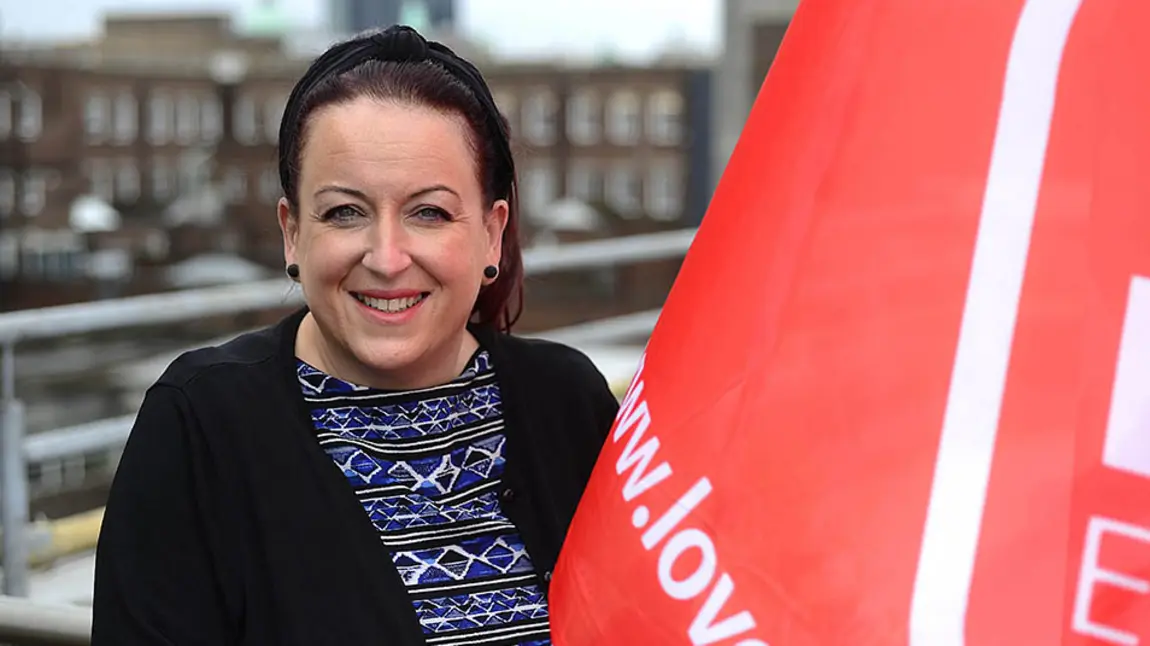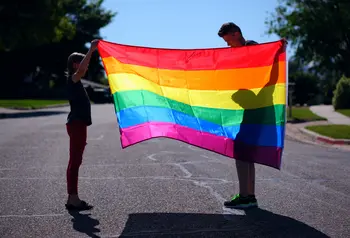Hope for Northern Ireland’s LGBT+ community, thanks to emergency funding

When Cara McCann heard about the coronavirus (COVID-19) lockdown, her first thought was for those who relied on her charity to get through the day.
Cara is the Director of HERe NI, the only organisation dedicated to supporting lesbian and bisexual women in Northern Ireland.
"My fear was that our users would become even more isolated than they are already."
She was terrified for the people she engaged with every day. “My fear was that they would become even more isolated than they are already. I was worried about our service users who have emotional health and wellbeing issues and also those with physical health problems, and those who are at risk of violence in their home.
"Another fear was that they would not engage [with us] due to anxiety around technology – this is a real fear for our older women.”
Most of all she feared that HERe NI itself would not be able to keep its doors open. The charity's main funding was set to end in June 2020, and at the time the pandemic hit, many of its other funding applications were still up in the air.
"A roof over our heads"
Thanks to National Lottery players, Cara and her team were able to apply for £24,000 from the Heritage Emergency Fund, as well as some other funding.
The cash was crucial. It has been used for key salaries and associated overheads – enabling this vital service to keep staff on and “to have a roof over our heads when the time is right to return to work”.
They have also tried many online activities, often for the first time, a lifesaver for some of Northern Ireland’s isolated LGBT+ community. The team have created a private Facebook page during lockdown and increased their online events to several a day. They have also been able to increase their one-to-one work, providing support via email, video call, text message and phone.
Cara has seen many of her users experiencing poorer mental health and feeling “very lonely”. But the funding has helped her team to “reach out to more women and have seen an increase in women accessing our services who we have never engaged with before”.
Campaigning for equal rights
Coronavirus (COVID-19) is by no means the first hurdle LGBT+ people have faced in Northern Ireland. Homosexuality was not decriminalised in the country until 1982, 15 years after legislation was passed in England. The first same-sex marriages took place earlier this year.
"One difficulty is that some of our elected representatives refuse to engage with us. Some politicians are in opposition to the very things we fight for every single day."
Since its first days in 1999, HERe NI has campaigned for equal rights for Northern Ireland’s gay and bisexual women in particular. It has been a rocky road. “One difficulty is that some of our elected representatives refuse to engage with us or do engage in a way that is not meaningful. Some politicians are in opposition to the very things we fight for every single day," says Cara.
"Not so long ago we had years of no local government and this had a knock-on effect for the most vulnerable in society. There is still not full marriage equality here – people like myself who are in a civil partnership still do not have the option to convert it to a marriage. We will continue to lobby for this.”
This difficult history is being told through The National Lottery Heritage Fund’s first large-scale LGBT+ project to be be funded in Northern Ireland, part-run by HereNI alongside The Rainbow Project and Cara-Friend. Heritage Emergency Fund investment is being used to keep this project going and to engage people and volunteers with what is a vital record of recent gay history in the country.
Applying for funding
As an LGBT+ community group, it has not always been easy to access funding says Cara, who is working on ways to make HERe NI more sustainable and to diversify more from grant funding in the future. "Often the way the questions are phrased make it difficult for us to state exactly what our issues are."
"We have engaged with several funders over this issue and I have observed some changes: we can now often write a narrative regarding what we want the funding for. Another very welcomed change is a face-to-face assessment. I know my organisation inside out and feel this is a brilliant opportunity to elaborate on your funding idea."
"Please consider applying! The Heritage Emergency Fund has kept our organisation afloat in the most challenging, difficult times."
As for the Heritage Emergency Fund, she says to other LGBT+ and community groups: “Please consider applying! I think there is a notion that the Heritage Emergency Fund is around the preservation of buildings but it is not. It has kept our organisation afloat in the most challenging, difficult times.
"Read, read and re-read the guidance documents and build up a relationship with your potential funder. If you are unsure, please lift up the phone – the staff are extremely supportive and will guide you through the process.”
Last chance to apply for support
The National Lottery Heritage Fund is committed to helping the heritage sector through this crisis.
Our £50m Heritage Emergency Fund is open for grants from £3,000–£250,000 until 12noon on 31 July.
We want to support as many organisations as we can. Submit an application before the deadline so we can help your organisation too.
Additional support includes:
-
Digital Skills for Heritage: increasing sector skills and confidence to bring heritage to more people
-
maintaining our financial commitment to all of our 2,500 existing projects
-
help and advice from our UK-wide teams



